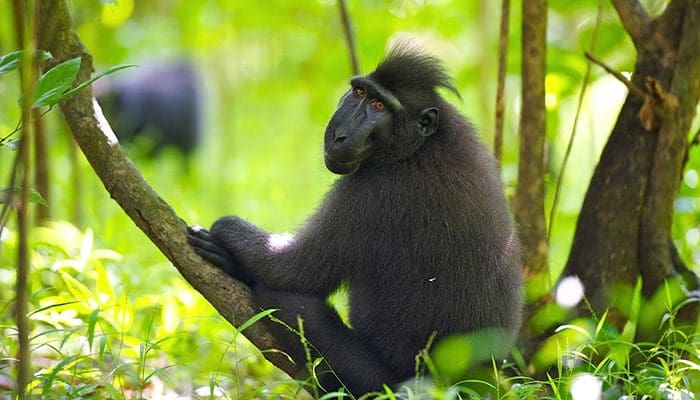
A lesser known land critter
Many people come to North Sulawesi with the purpose of diving the world famous dive areas of the Lembeh Strait and Bunaken National Marine Park but on land there are also some very special ‘critters’ as well. A trip to Tangkoko National Park, situated near the village of Batu Putih, often has the primary focus of getting to see the Tarsiers which are only found in a few places in the world. We always love to see the Tarsiers but it is also very exciting when we get to see Celebes Crested Macaques as well. On recent visits many of our guests have been treated to seeing up 60 0r 70 of these amazing creatures up close and personal!
Here is a little more information about the Celebes Crested Macaques or Black Crested Macaques. They are duirnal (day time) rainforest dwellers and they spend around 60% of their time on the ground foraging for food and socializing. At night they will climb up high in the larger trees in order to get a good nights sleep!
Macaques are very social animals (a bit like us humans!) and tend to live in groups of around 5 – 25 animals, with females normally outnumbering the males 4 to 1! In order to keep the ‘peace’, Macaques use a series of gestures and vocalisations to avoid direct conflict such as lip smacking (where the lips are tightly smacked together and the tongue moved back and forth), which can been seen as a submissive gesture, or ‘yawning’ which is mainly used by adult males to display their large canine teeth and generally occurs during a tense situation to assert dominance. You will often see these displays whilst watching the macaques in Tangkoko. Breeding is non-seasonal – it can take place at any time of year, which is great news as there is always a chance seeing some very cute juveniles!! Black Macaques are largely vegetarian and Tangkoko National Park supports large numbers of these animals as it supplies them plenty of the food they need – 70% of their diet consists of fruit, in particular figs,
and is supplemented with leaves, buds, seeds and insects.
Click here for information on our Tangkoko National Park tour as well as the other excursions we can run!

